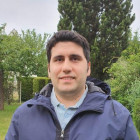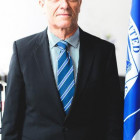Presentations
All In on OER
Date Friday, Dec 3 Time – Room: Tiergarten
We will discuss initiatives that are supporting the implementation, adoption and progress of Open Education initiatives and Open Educational Resources.
Speakers will cover issues around access, sustainability models & open degrees, and high quality personalised OER content recommendations.

Mohammadreza Tavakoli Tavakoli
Researcher, Leibniz Information Centre for Science and Technology, Germany
I am a doctoral candidate in the Joint Lab of the TIB and the L3S research center and work in the young research group Learning and Skill Analyticsat the interface between the labor market and education. In our project, we coordinate work and skills and provide personalized training recommendations for learners to help them achieve the skills required for their target occupations. I have an M.Sc. in Computer Science from Sharif University of Technology, Tehran, Iran. During my master's degree, I focused on analyzing user behavior on the most popular question-and-answer website for programmers called Stack Overflow, and I was also a teaching assistant for several courses at Sharif University of Technology. Before joining L3S and TIB, I was a team leader and data scientist at Digikala (the largest e-commerce company in the Middle East) where we analyzed customer behavior.

Andreas Rambow
Senior Consultant for Applied Learning Solutions, Webster University, Leiden, Netherlands, Netherlands
Dr. Rambow is an educational adviser, consultant, and instructional designer with more than 25 years of leadership experience in higher education. He uses an evidence-based approach to provide consulting and advising services in the following areas of higher education to clients worldwide: competence-based learning (CPL), problem-based learning (PBL), syllabus creation and virtual classroom design, best practices in blended learning, student engagement, training in learning management systems (Canvas, Blackboard, Desire2Learn, Moodle), faculty development, use of open educational resources, and executive education (accounting, finance, economics). He teaches finance, accounting, economics, and general management to non-traditional students, senior managers, and executives. He has extensive experience working with students, learners, and executives from a distance, using appropriate synchronous and asynchronous platform solutions for online teaching and learning. Dr. Rambow has also been involved in the design of corporate training programs for UMUC and instrumental in implementing the online program between 2004 and 2011. The online program has won numerous awards in the United States, including the SLOAN award.

Ulf-Daniel Ehlers
Professor for Educational Management and Lifelong Learning, Baden-Wuerttemberg Cooperative State University Karlsruhe, DHBW, Germany
Ulf-Daniel Ehlers has been appointed Professor for Educational Management and Lifelong Learning at the Baden-Wuerttemberg Cooperative State University in Karlsruhe in 2011. From 2011-2016 he held the position of Vice president at the same university and has been responsible for Quality and Academic Affairs. He is the elected Vice-president of the European Association for Institutes of Higher Education in his second term (2017-today) and director and member of the executive committee of the European Distance and E-Learning Network (2018-2021). Ulf is founding member and past President of the European Foundation for Quality in E-Learning (2011-2014). He has served as elected President of the largest Association for E-Learning in German speaking countries, The Society for Media in Science (GMW e.V.) (2008-2010).
Links
Torunn Gjelsvik
Secretary General, International Council for Open and Distance Education, ICDE, Norway
Torunn Gjelsvik from Oslo, Norway, is the Secretary General of ICDE - International Council for Open and Distance Education. With specialization in open, flexible, distance and online learning, Torunn is a strong advocate for inclusive, scalable and sustainable education and lifelong learning opportunities for all.
Gjelsvik holds a Masters’ degree in Nordic languages and literature, and her education background includes French, History, Management and Strategic communication. She started working with development of distance and online education in 2000, and has held various national and international leadership positions within the field.
Gjelsvik’s international experience covers advocacy, policy advice, international networks and partnerships, global events and cross-country project management related to the global field of open, flexible, distance and online education. She is often seen as a speaker or panelist at international education conferences around the globe.
Links
Building a European Ecosystem for OER: Lessons Learnt from a Collaborative Approach to Foster Innovation in Higher Education and Business, Torunn Gjelsvik, Ulf-Daniel Ehlers
ENCORE+ – the European Network for Catalysing Open Resources in Education has set out to initiate a multi-stakeholder and sustainable European OER ecosystem. Stakeholders from both academia and business across Europe and beyond have come together to pave the way forward and jointly generate solutions to key challenges of OER. The ENCORE+ “Circles” are designed to support and facilitate engagement around the focus areas of technology, quality, policy and innovation.
ENCORE+ is excited to share findings and lessons learnt from the inception of the ENCORE+ European OER Ecosystem and Community “Circles”. The lessons learnt from the four circle events in the fall of 2021 are substituted by research findings, including among other things the results of a pan-European stakeholder survey on the value of OER.
Outcomes:
- In this session you will get real-life examples of business applications of OER
- In this session you will get insights into the collaboration potential of academia and business in an OER perspective
- In this session you will learn about the European OER Ecosystem, ENCORE+ and the opportunity to connect with like-minded people across Europe.
- In this session you will get a European Perspective on OER as a catalyst and multiplier for innovation in higher education and business
Using Open Educational Resources as a Tool for Resilience and Social Justice, Andreas Rambow
Open educational resources (OER) can open ways and opportunities for many people worldwide to obtain a university degree. OER initiatives are vital for the academic and professional advancement of global higher education. Research and studies point to the dilemmas a lack of OER can create. This presentation will identify current gaps in the global implementation process of OER and why these gaps exist.
Outcomes:
- Identify gaps in the implementation process of open educational resources
- Determine ways to address the need for OER implementation
- Develop a tool-set for the promotion and selection of OER
OER Recommendation System to Support Goal-Driven Learning, Mohammadreza Tavakoli Tavakoli
Although OERs are extremely useful in offering high-quality learning environments, challenges such as lack of automatic and intelligent quality control processes and property (e.g. title, description, subject) extraction, which are required in building educational services, limit the use of OERs.
This presentation will present intelligent solutions to increase the usability of OERs by automatically:
1. assessing the quality of the published OERs
2. extracting properties (e.g. target subjects, language, format-type, and level) from them
Moreover, based on these solutions, goal-driven individualised education can be offered to help students achieve set learning outcomes by recommending personalised OERs
Join us to hear more about the system that we built in which learners
1. set their learning goals as target jobs or skills
2. receive a customised learning path based on the subject analysis on the existing related OERs and their current skill set
3. find personalised high-quality OER based on the created learning path
Outcomes:
- What are the key challenges that limit the use of OERs
- How can we use manual quality controlled OERs to extract some best practices for generating and validating the future OERs
- What are the key properties and metadata of OERs that we need to store to provide OER based services and accordingly how we can integrate different OER repositories
- How to offer personalised learning services based on OERs